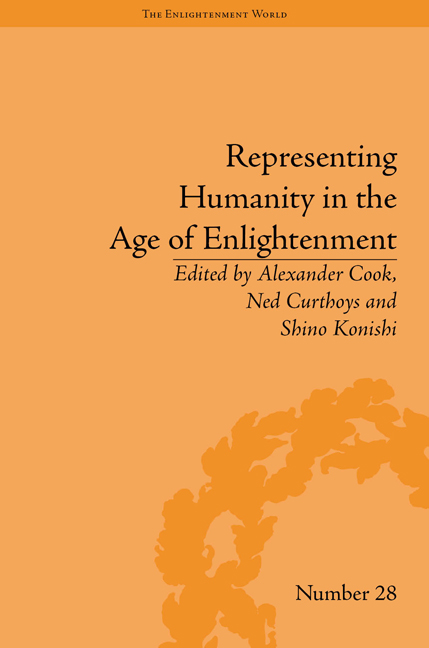Book contents
- Frontmatter
- CONTENTS
- Acknowledgements
- Dedication
- List of Contributors
- List of Figures
- The Science and Politics of Humanity in the Eighteenth Century: An Introduction
- Part I Humanity and the Civilizing Process
- 1 Representing Humanity during the French Revolution: Volney's ‘General Assembly of Peoples’
- 2 Representing Woman: Historicizing Women in the Age of Enlightenment
- 3 Sheer Folly and Derangement: How the Crusades Disoriented Enlightenment Historiography
- 4 Turning Things Around Together: Enlightenment and Conversation
- 5 Moses Mendelssohn and the Character of Virtue
- Part II Encountering Humanity
- Part III The Limits of Humanity
- Notes
- Index
3 - Sheer Folly and Derangement: How the Crusades Disoriented Enlightenment Historiography
from Part I - Humanity and the Civilizing Process
- Frontmatter
- CONTENTS
- Acknowledgements
- Dedication
- List of Contributors
- List of Figures
- The Science and Politics of Humanity in the Eighteenth Century: An Introduction
- Part I Humanity and the Civilizing Process
- 1 Representing Humanity during the French Revolution: Volney's ‘General Assembly of Peoples’
- 2 Representing Woman: Historicizing Women in the Age of Enlightenment
- 3 Sheer Folly and Derangement: How the Crusades Disoriented Enlightenment Historiography
- 4 Turning Things Around Together: Enlightenment and Conversation
- 5 Moses Mendelssohn and the Character of Virtue
- Part II Encountering Humanity
- Part III The Limits of Humanity
- Notes
- Index
Summary
the noise of these petty wars and commotions [amongst the Normans] was quite sunk in the tumult of the Crusades, which now engrossed the attention of Europe and have ever since employed the curiosity of mankind, as the most signal and most durable monument of human folly, that has yet appeared in any age or nation.
David Hume, The History of England (1754–62)The only common enterprise in which the European nations were engaged, and which all undertook with equal ardour, remains a singular monument of human folly.
William Robertson, The History of the Reign of the Emperor Charles V (1774)some philosophers have applauded the propitious influence of these holy wars, which appear to me to have checked rather than forwarded the maturity of Europe. The lives and labours of millions, which were buried in the East, would have been more profitably employed in the improvement of their native country: the accumulated stock of industry and wealth would have overflowed in navigation and trade; and the Latins would have been enriched and enlightened by a pure and friendly correspondence with the climates of the East.
Gibbon, The History of the Decline and Fall of the Roman Empire (1776–8)In this essay I explore the thinking of the Enlightenment historians David Hume, William Robertson and Edward Gibbon regarding Islam and the medieval Arab world that stretched from the eastern Mediterranean to Spain in the west.
- Type
- Chapter
- Information
- Representing Humanity in the Age of Enlightenment , pp. 41 - 52Publisher: Pickering & ChattoFirst published in: 2014

